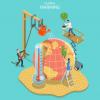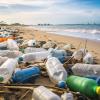
Over the past decade, the climate change research community developed a scenario framework that combines alternative futures of climate and society to facilitate integrated research and consistent assessment to inform policy. An international team of researchers assessed how well this framework is working and what challenges it faces.
The scenario framework contains a set of scenarios about how society may evolve in the future ̶ so-called Shared Socioeconomic Pathways (SSPs) ̶ and defines different levels of climate change known as Representative Concentration Pathways (RCPs). Combining both aspects of the framework allows researchers to develop integrated analyses of how future societies can avoid climate change and cope with its impacts.
“The SSPs started with brief global narratives combined with projections of a few key variables like GDP, population, and urbanization. In the past few years, researchers extended the SSPs to individual countries, cities, and sectors. They’ve also added new indicators, such as governance, income distribution, access to basic services, and air pollution. The framework has been widely and successfully applied, and has shaped climate change research,” explains Brian O’Neill, director of the Joint Global Change Research Institute (JGCRI) and main author of the assessment published in Nature Climate Change.
“The scenarios framework allows scientists to use similar scenarios across many different studies. Individual research projects don’t need to develop their own scenario storylines and quantifications but can build on the work of others. Once many studies use comparable scenarios, it becomes more straightforward to assess the literature for insights that emerge across these studies. This means that large scientific assessments like the Intergovernmental Panel on Climate Change (IPCC) and the Intergovernmental Science-Policy Platform on Biodiversity and Ecosystem Services (IPBES) can use the framework to structure their analyses and reports,” adds IIASA researcher Bas van Ruijven, one of the authors of the study and co-chair of the International Committee on New Integrated Climate Change Assessment Scenarios (ICONICS).
In their paper, the authors synthesize the insights from the first ever Scenarios Forum organized by the University of Denver and ICONICS in Denver, CO in March 2019, and present the first in-depth literature analysis of the SSP-RCP scenarios framework. They specifically looked into how useful the framework has been for researchers, which topics the SSPs have been used for, and what can be done to improve the framework and make it more useful for future studies.
The results show that the framework has been used in almost 1,400 studies over the past five years, of which about half are related to climate impacts, one-third to avoiding climate change, and the remainder to extensions or methodological improvements. Encouragingly, the findings indicate that the scenarios framework enables research that had not been possible before, such as estimating the combined impacts of socioeconomic and climate changes on exposure to climate risks. The insights from this new study will help researchers to improve the framework and make it even more useful over the next five years. The study also revealed that some studies use unlikely combinations of socioeconomic assumptions with the highest climate change outcomes (the so-called RCP8.5 pathway). They caution that researchers should be more careful using this high climate change scenario for their studies in combination with a development pathway aiming to sustainable development, as well as in communication about their findings.
The authors identified seven recommendations for future work:
- Improving the integration of societal and climate conditions
- Improving applicability to regional and local scales
- Improving relevance beyond the climate research community
- Producing a broader range of reference scenarios that include impacts and policy
- Capturing relevant perspectives and uncertainties
- Keeping scenarios up to date, and
- Improving the relevance of climate change scenario applications for users.
“While the scenarios framework is mostly used by researchers, it has also been translated into accessible non-technical language for the public. It has had a significant impact on how we study and think about future climate change. By identifying the weaknesses of the existing framework, we improve the utility of the framework for future studies. Also, by combining socioeconomic and climate change scenarios with other societal objectives (e.g., biodiversity), we can paint a more concrete picture of what future societies might look like and systematically explore how to avoid climate change and how to cope with its impacts,” notes IIASA Energy Program Director Keywan Riahi, who was also a study author.
Going forward, ICONICS and IIASA will support the research community in further improving the scenarios framework. To facilitate these developments, the two organizations will organize an online seminar and discussion series starting in January 2021. To foster and track progress, and revise goals as experience accumulates, the Scenarios Forum is intended to become a regular biennial event. To this end, IIASA and the ICONICS Steering Committee plan to host the second Scenarios Forum in Laxenburg, Austria in 2022.
Reference:
O’Neill B, Carter T, Ebi K, Harrison P, Kemp-Benedict E, Kok K, Kriegler E, Preston B, Riahi K, et al. (2020). Achievements and needs for the climate change scenario framework. Nature Climate Change DOI: 10.1038/s41558-020-00952-0
News

28 June 2024
Drowning in waste: pollution hotspots in aquatic environments

27 June 2024
What can social media tell us about public views on climate change?

21 June 2024


